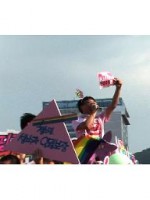130, Suyeonggangbyeon-daero,
Haeundae-gu, Busan, Republic of Korea,
48058
DATABASE
Miracle on Jongno Street (2011)
< Jong-no-ui gi-jeok >
“It’s the golden age of my gay life!” The first campy gay documentary by a gay director from Korea―Miracle on Jongno Street.
Jongno(“Bell Street”) in Seoul, has been a cultural ghetto for gay men since at least the 1980’s. Currently home to over 100 business establishments and human rights activist organizations mainly for gay men, it is an indispensable community and a safe haven where sexual minorities, through unfettered communication and encounters, ha...more
Jongno(“Bell Street”) in Seoul, has been a cultural ghetto for gay men since at least the 1980’s. Currently home to over 100 business establishments and human rights activist organizations mainly for gay men, it is an indispensable community and a safe haven where sexual minorities, through unfettered communication and encounters, ha...more
| Genre | Documentary | Production Status | Released |
|---|---|---|---|
| Running Time | 109min | Release Date | Jun 02, 2011 |
| Country | South Korea | Rating | 15 |
| Language | Korean | Co-Production | N |
| Original |
-
Number of Screens : 16
-
Total Admissions : 7,894
-
Total Gross : $40,140
As of Feb 16, 2026
-
Cinema DAL | cinemadal@cinemadal.com
- Republication, copying or redistribution by any means is prohibited without the prior permission of KOFIC and the original news source.






















